HIPAA Compliance Checklist for 2025

If your DocuSign bill looks more like a mystery novel than a monthly report, you’re not alone. Many enterprises find themselves signing off on invoices they barely understand. Between seat-based licenses and team-level add-ons, DocuSign pricing can quietly spiral into something unrecognizable.
Here’s the real kicker: Gartner found that over 30% of SaaS licenses in large enterprises go unused, costing millions annually. Now imagine how much of that waste hides inside electronic signature tools alone.
That’s where CloudEagle.ai steps in to give you clarity into your Docusign license management. It helps enterprises uncover underutilized licenses, track usage patterns, and reclaim every dollar lost in the DocuSign maze.
TL;DR
- DocuSign’s pricing is complex and fragmented, with per-seat models, API credits, and regional bundles often leading to confusion and overspending.
- Unused and auto-renewed licenses quietly drain budgets, as inactive seats and duplicate contracts remain unnoticed across departments.
- Finance teams often lack accurate usage visibility, since reporting is delayed, disconnected, or misinterpreted between IT, legal, and procurement.
- License mismanagement causes security and compliance gaps, from duplicate user accounts to overlapping regional contracts that complicate audits.
- CloudEagle.ai fixes these pain points by centralizing DocuSign license tracking, automating renewals, reclaiming idle seats, and benchmarking pricing for smarter spend control.
The DocuSign License Maze No One Warned You About
You think buying DocuSign licenses is simple: one team, one plan, one bill. In reality, it’s a labyrinth of tiers, credits, and “enterprise bundles” that sound great until you see the invoice. Let’s decode the DocuSign pricing chaos for a second:
The “Per Seat, Per Confusion” Model
Every user gets a license, sure. But are they all actually using it? Spoiler: half of them probably aren’t. Many organizations discover inactive DocuSign login seats months later, long after auto-renewals kicked in.
The API Credit Roulette
If your developers use DocuSign integrations, you’re also paying for API credits. But those credits aren’t pooled neatly across teams. One department can run dry while another’s balance gathers dust. Fair? Not really.
The ‘Enterprise Flex’ Illusion
DocuSign’s enterprise plans promise flexibility, but that often means juggling add-ons like advanced workflows or compliance packs. Each comes with its own DocuSign pricing logic, invoice, and headache.
Regional Licensing Gaps
Some teams buy licenses regionally, others globally, and before you know it, finance can’t even tell how many contracts you’re actually paying for.
It’s not that the DocuSign free or paid model is bad; it’s just built for scale, not simplicity. And that’s why enterprises often end up with signed contracts for licenses they no longer need.
The Costs That Creep In When No One’s Watching
You know the real trouble with DocuSign pricing? They sneak in quietly, an unused seat here, an auto-renewal there. And by Q4, Finance is staring at a mystery line item that no one remembers approving.
DocuSign’s no exception. DocuSign free and paid plans are great until flexibility turns into fragmentation. What starts as “just a few extra seats for the legal team” soon becomes a slow bleed on your annual budget.
1. Renewals That Quietly Auto-Approve Themselves
It’s easy to miss a DocuSign renewal during automatic SaaS renewal management every quarter. One unnoticed email, one unchecked renewal setting, and suddenly, you’re paying for the cost of Docusign no one reviewed.
- Why it happens: Renewal alerts often go to outdated inboxes or get lost in automated workflows. Without centralized tracking of DocuSign login, renewals slip through unnoticed.
- The outcome: Teams keep paying for licenses they no longer use, draining budgets in small, invisible increments.
Gartner’s Alex Johnston notes,
“Unmanaged renewals are the silent drain of SaaS budgets—individually minor, collectively significant.”
It’s not dramatic overspending that hurts most. In fact, it’s these quiet, recurring charges that never make a sound.
2. Idle Licenses Masquerading as ‘Essential’
Here’s a secret every IT manager knows but hates to admit. Half the “essential” licenses in your DocuSign bill haven’t seen action in months. They just sit there, comfortably billed, without you even knowing.
- False sense of activity: Because the account’s still assigned, finance assumes it’s being used. Spoiler: it’s not.
- Overlapping workflows: When teams switch to shared templates or automation, those individual licenses quietly become obsolete, but nobody tells procurement.
- Renewals by habit: “We renewed it last year, so let’s renew it again”, the world’s most expensive mantra.
A 2024 Forbes report found that organizations waste an average of 32% of their SaaS spend on unused or underutilized licenses. This number is both shocking and strangely believable if you’ve ever peeked at a renewal spreadsheet.
It’s not neglect; it’s just what happens when visibility on the cost of Docusign fades. And once finance realizes the truth, the ghost licenses have already had their party, on your budget’s tab.
3. Usage Data That Never Reaches Finance
You know that feeling when you check the DocuSign dashboard and see activity, but by the time the report lands in finance, it looks suspicious? That’s because usage data often gets lost in translation between teams.
Delayed reporting
Legal or sales teams may be sending signatures every day, but finance only sees aggregated monthly numbers. Critical trends get buried.
Disconnected tools
If your reporting doesn’t integrate with procurement or accounting systems, it’s like playing telephone, every update loses a bit of meaning.
Misinterpreted metrics
Active logins don’t always equal actual usage. One login could mean 10 contracts signed, or just a test signature to check a template.
According to a 2023 report by Vena Solutions, 46% of organizations admitted they couldn’t accurately track SaaS usage across departments. Translation: nearly half of budgets are flying blind.
Without a single source of truth, finance teams are left guessing, and guesswork is expensive.
When License Mismanagement Turns Into an IT Fire Drill
Even small lapses in SaaS license management can ripple across IT and finance teams. Forgotten subscriptions, mismatched permissions, and untracked cost of Docusign creates unnecessary stress. What starts as a minor oversight can quickly demand urgent attention from multiple teams.
1. Duplicate Accounts That Invite Security Gaps
When the same user ends up with multiple DocuSign accounts across teams or departments, it becomes messy. They are causes of data breaches waiting to happen. Each duplicate account multiplies the attack surface, making it harder to enforce consistent permissions and track activities effectively.
- Confusing Access Control: IT teams struggle to assign correct permissions, increasing the risk of unauthorized document access.
- Audit Nightmares: During compliance checks, multiple accounts for the same person create discrepancies that raise red flags with auditors.
- Credential Overload: Users juggling multiple logins are more likely to reuse passwords, opening doors to breaches.
As cybersecurity expert Bruce Schneier once said,
“Complexity is the enemy of security.”
Duplicate accounts are a textbook example, what starts as convenience quickly becomes SaaS security risks.
2. Overlapping Contracts Across Departments
In many enterprises, different departments purchase DocuSign licenses independently, often without a central view of existing contracts. This leads to overlapping agreements that can inflate DocuSign costs unnecessarily and complicate renewals.
From a management perspective, overlapping contracts create confusion during budgeting and make it harder to negotiate during SaaS vendor management. Finance teams struggle to consolidate costs, while IT teams face difficulties in tracking license allocations.
3. Manual Tracking That Eats Away at Productivity
Relying solely on spreadsheets or email threads to track DocuSign licenses can quickly turn simple tasks into time-consuming chaos. The process becomes repetitive, error-prone, and drains your team’s focus from higher-value work.
- Constant Updates Required: Teams must manually adjust license allocations as employees join, leave, or change roles.
- Error Prone Reconciliation: Simple misentries can cause confusion over who actually needs a license.
- Delayed Insights: Waiting for reports or audits slows decision-making and can leave unused licenses lingering.
By blending some automation and smarter workflows, enterprises can regain control and focus on productivity rather than chasing numbers.
How CloudEagle.ai Puts an End to the License Chaos
Managing DocuSign licenses across multiple SSO logs, usage reports, and invoices can quickly become chaotic. Spreadsheets may cover only a handful of core applications, leaving hundreds of others unmonitored.
This fragmented approach leads to unnecessary spending, compliance risks, and missed opportunities for optimization.
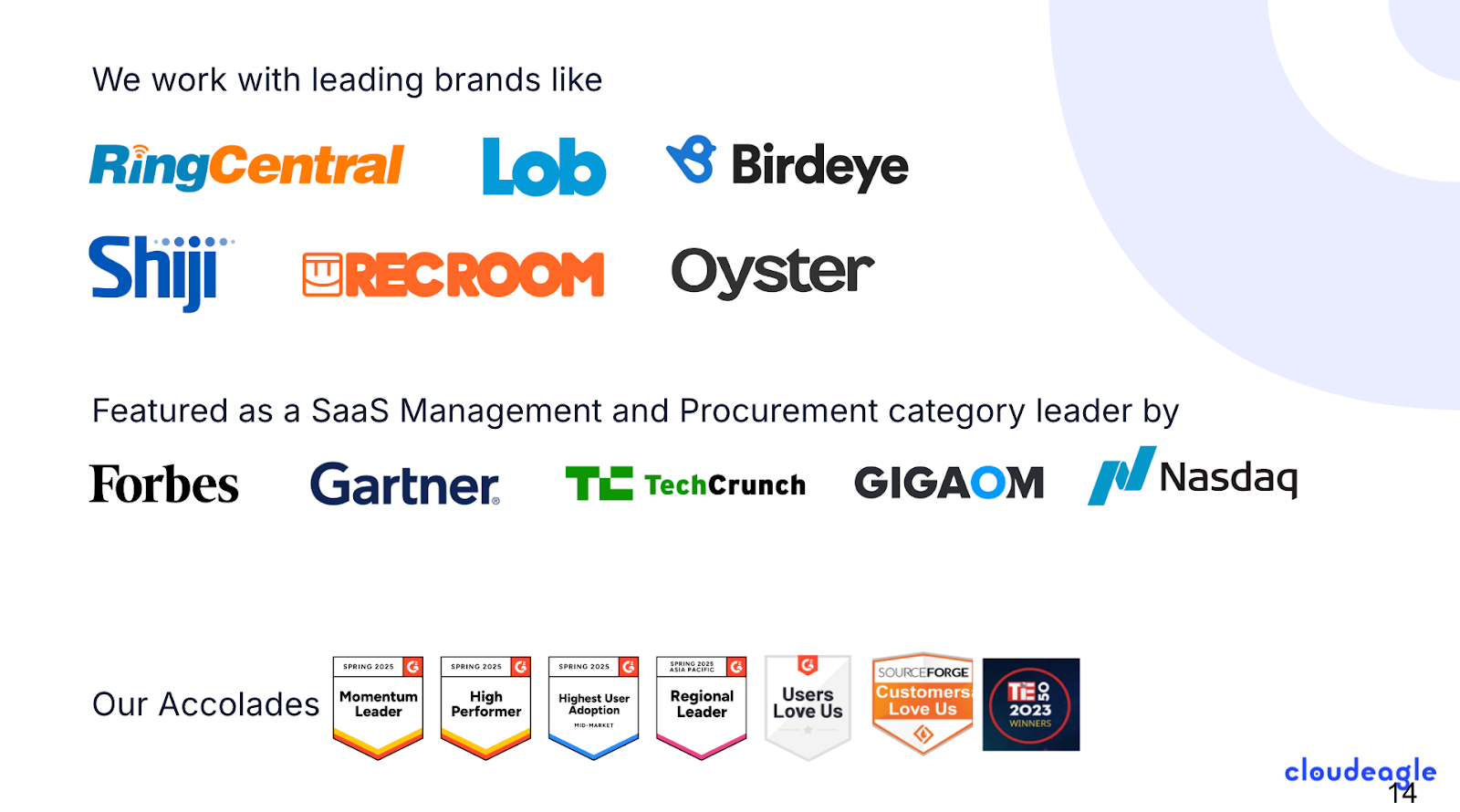
CloudEagle.ai provides a centralized, real-time view of all licenses and spending. It automates tracking, usage analysis, and renewals, transforming a disjointed, manual process into an organized, data-driven workflow.
1. Seamless DocuSign Admin Console Integration
Manually managing DocuSign licenses is slow, error-prone, and frustrating. Creating spreadsheets often takes weeks, and by the time they’re ready, the data may already be outdated, leaving IT teams with an incomplete understanding of subscriptions, usage, and DocuSign costs.
Current Process
Organizations typically rely on spreadsheets and siloed systems to track renewals, license counts, and user activity. This approach fragments data, and updates are often outdated before they are reviewed.
Pain Points
Manual entry and delayed updates cause errors and blind spots in visibility of software spend. IT and finance teams lack accurate, real-time insights.
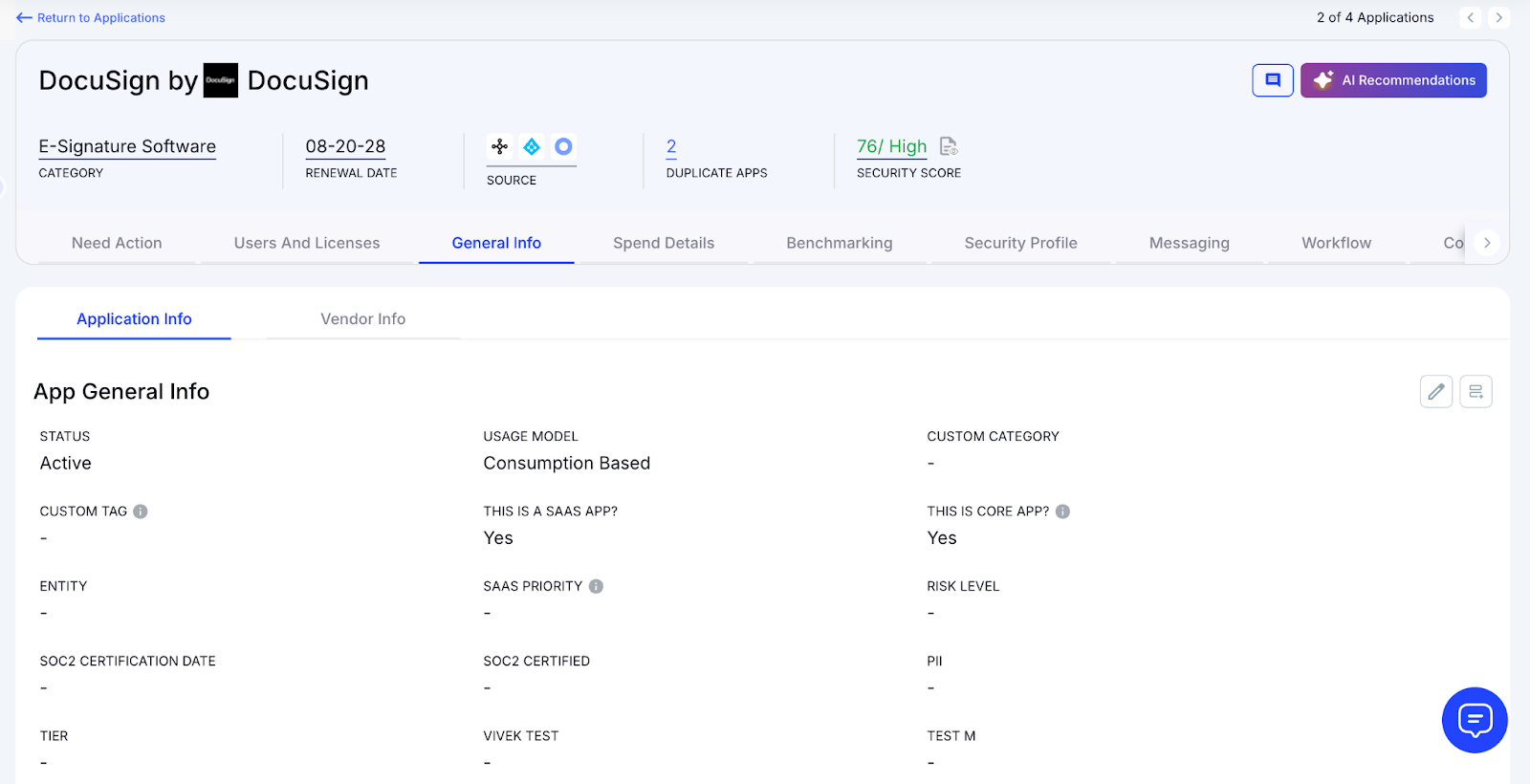
How We Do It
CloudEagle.ai aggregates vendor spend, usage data, and contract metadata from all connected systems in real time. Renewal dates, DocuSign costs, and usage are displayed side by side for easy analysis.
Why We Are Better
Onboarding is completed within days. With over 500 integrations and AI-driven metadata extraction, CloudEagle.ai centralizes all license data, keeping it accurate, reliable, and up to date.
2. Real-Time Usage Analytics & Shadow IT Detection
Without centralized oversight, managing DocuSign licenses and duplicate apps can become chaotic. Shadow IT often goes unnoticed, and IT teams struggle to identify users accessing redundant applications.
Current Process
Teams sometimes purchase duplicate applications using credit cards or free trials, which quietly convert into paid subscriptions. IT teams face challenges detecting duplicates or hidden usage.
Pain Points
Shadow IT generates untracked DocuSign costs and potential security risks. Manually detecting duplicates is time-consuming and often misses overlapping applications.

How We Do It
CloudEagle.ai’s AI automatically identifies duplicate and overlapping applications while tracking feature-level usage. Shadow apps are flagged immediately.
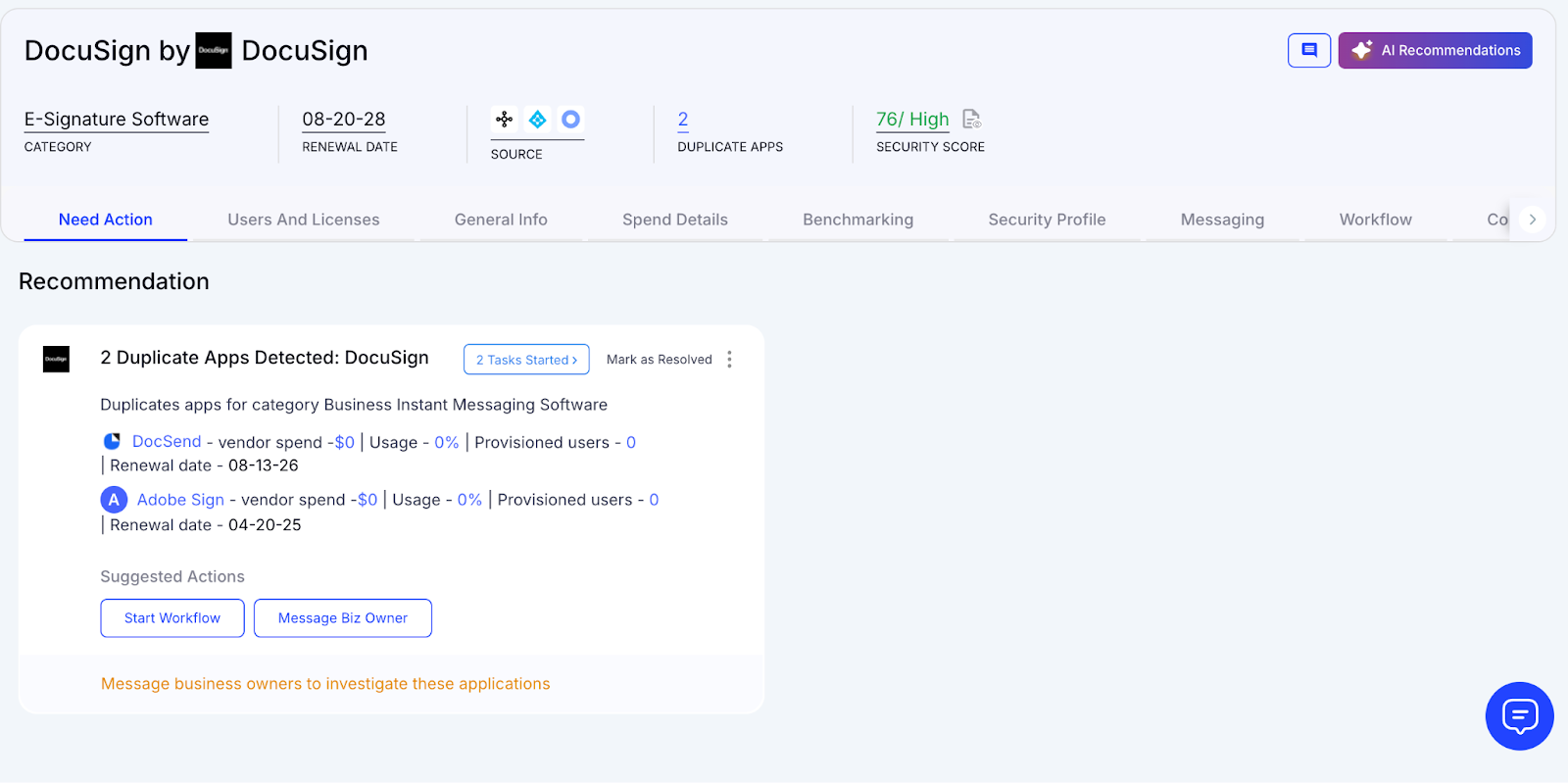
Why We Are Better
Our AI compares functionality, not just app names. IT teams can automatically email users, trigger workflows, or create ITSM tickets to reclaim licenses and reduce risk.
3. Centralized License Management
Monitoring DocuSign licenses across teams can become overwhelming. Many organizations rely on spreadsheets for top applications, manually correlating data from SSO logs, feature usage, and contracts.
Current Process
Most enterprises manage only their core applications in spreadsheets. Data from SSO logs, feature usage, and contracts is combined manually, which slows updates.
Pain Points
Unmanaged applications waste budget, and license reassignment rarely occurs. Renewal tracking is inconsistent, often resulting in missed cost savings.

How We Do It
CloudEagle.ai centralizes license management in one platform. Nightly syncs consolidate IDP, contract, and connector data to provide real-time visibility into usage.
Why We Are Better
Automatic updates correlate purchased licenses, users, and feature usage across all applications. Teams can filter by license type and make quick, data-backed decisions.
4. Automated License Harvesting
Unused DocuSign licenses silently drive up costs, yet IT teams often lack a systematic process to reclaim them. Manually tracking usage and sending weekly emails to hundreds of users is tedious, error-prone, and time-consuming.
Current Process
IT teams manually email inactive users and update spreadsheets, making the process slow, repetitive, and often skipped.
Pain Points
Inactive licenses remain active, draining budgets and increasing risk. Manual reclamation does not scale efficiently.
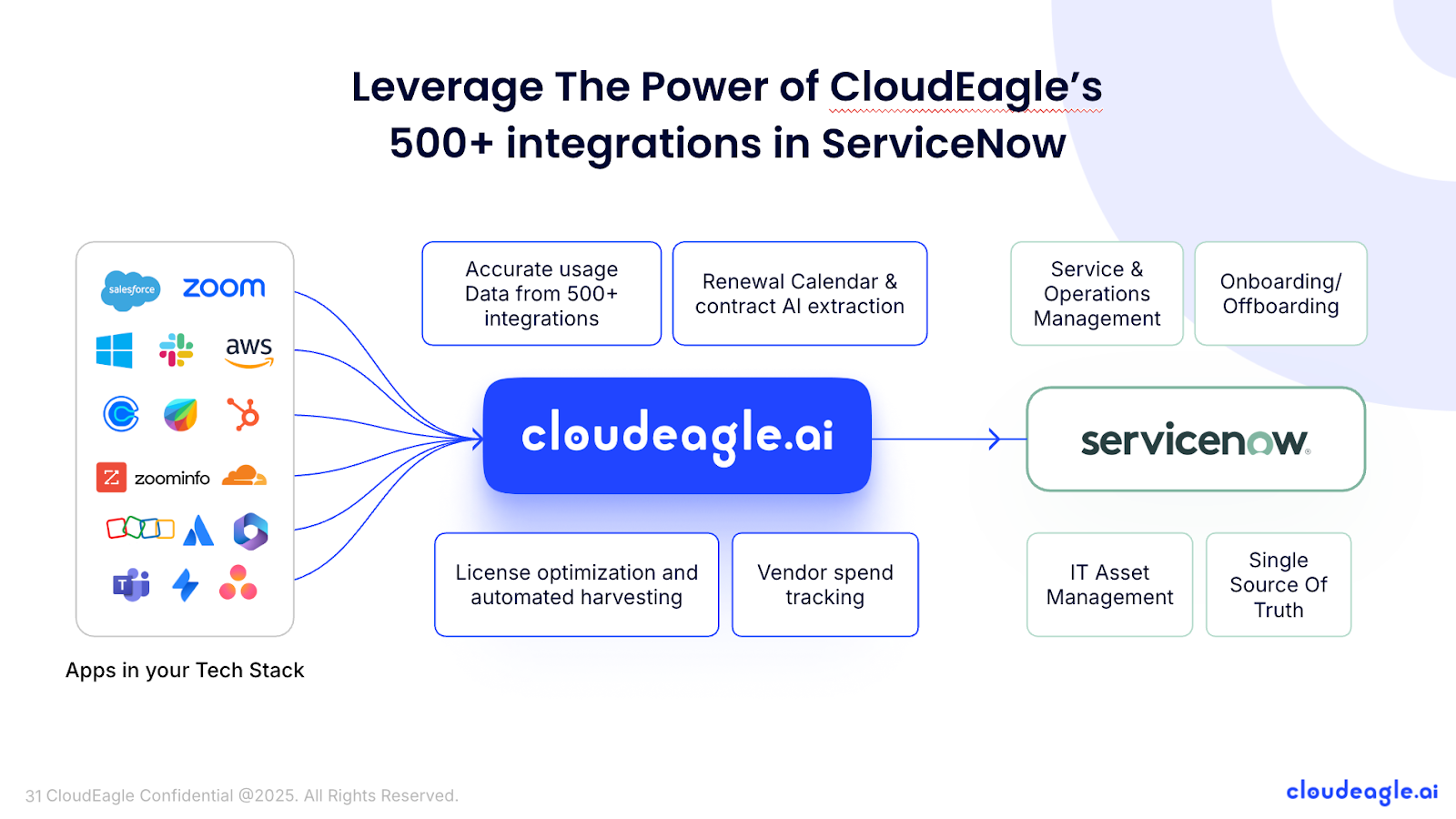
How We Do It
CloudEagle.ai automates license harvesting. Weekly workflows detect inactivity, notify users, and reclaim or downgrade licenses based on usage.
Why We Are Better
Automations run daily or weekly via Okta or Microsoft AD. Licenses are reclaimed instantly, reducing waste, saving time, and maximizing utilization.
5. License Price Benchmarking
CloudEagle.ai’s price benchmarking feature helps organizations get the most value during license renewals. By comparing contracts against industry standards, enterprises can secure competitive rates and avoid overpaying.
Current Process
Procurement teams rely on vendor quotes or outdated deals. Peer comparisons are limited and often do not reflect real market prices.
Pain Points
Teams lack accurate data for negotiations, which can lead to overpayment or unfavorable contract terms.
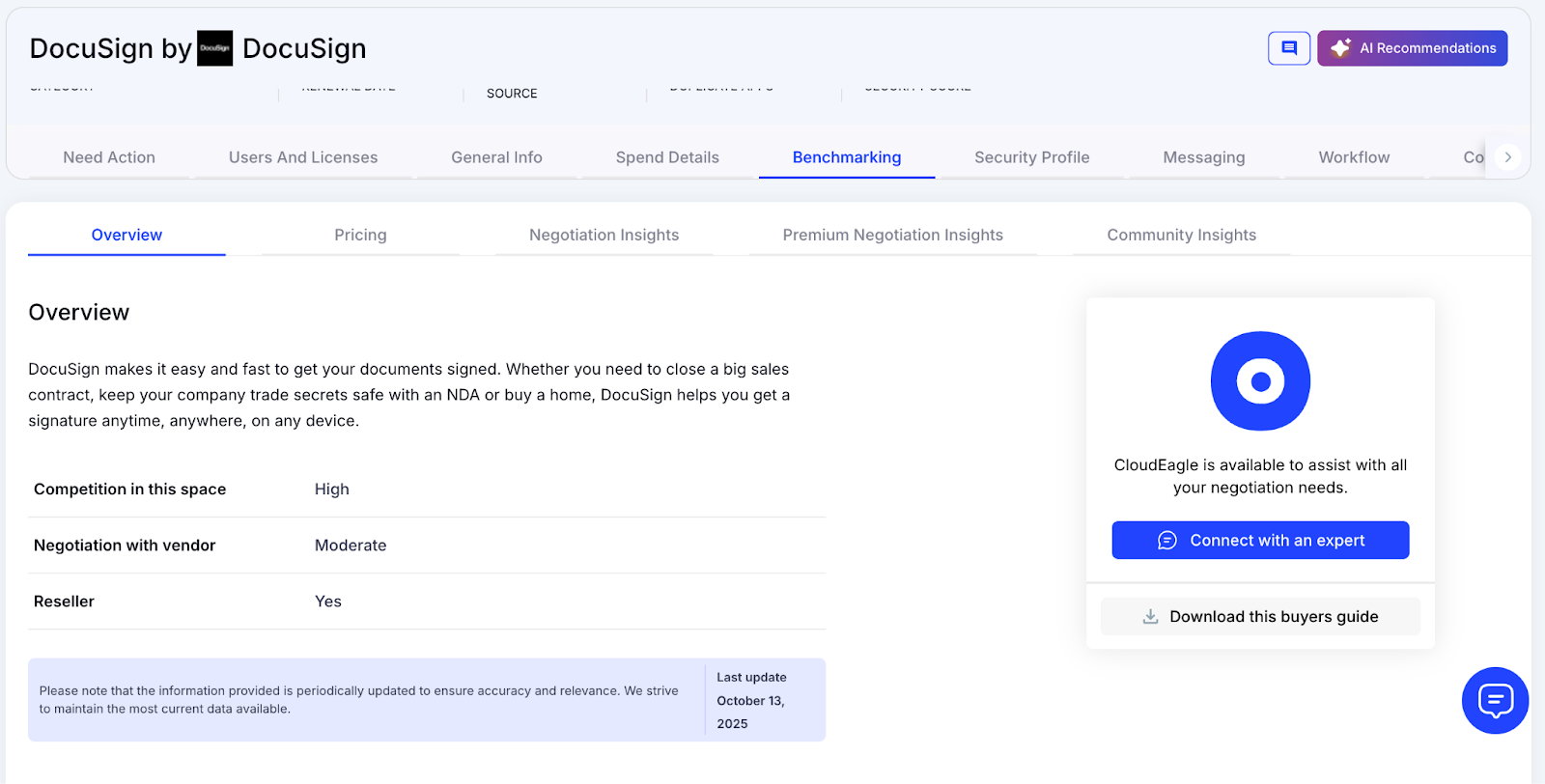
How We Do It
CloudEagle.ai delivers real-time price benchmarks, historical trends, and DocuSign pricing guides to support data-driven negotiation strategies.
Why We Are Better
DocuSign Pricing is detailed by SKU, license tier, and quantity, alongside key negotiation levers, ensuring renewals reflect actual market value.
6. Proactive Renewal Management
CloudEagle.ai offers renewal management with automated workflows triggered by contract dates. From approvals to adjusting DocuSign license counts, it ensures smooth management and prevents accidental auto-renewals.
Current Process
Renewals are tracked via spreadsheets and managed through long email chains. Approvals are slow, and auto-renewals often go unnoticed.
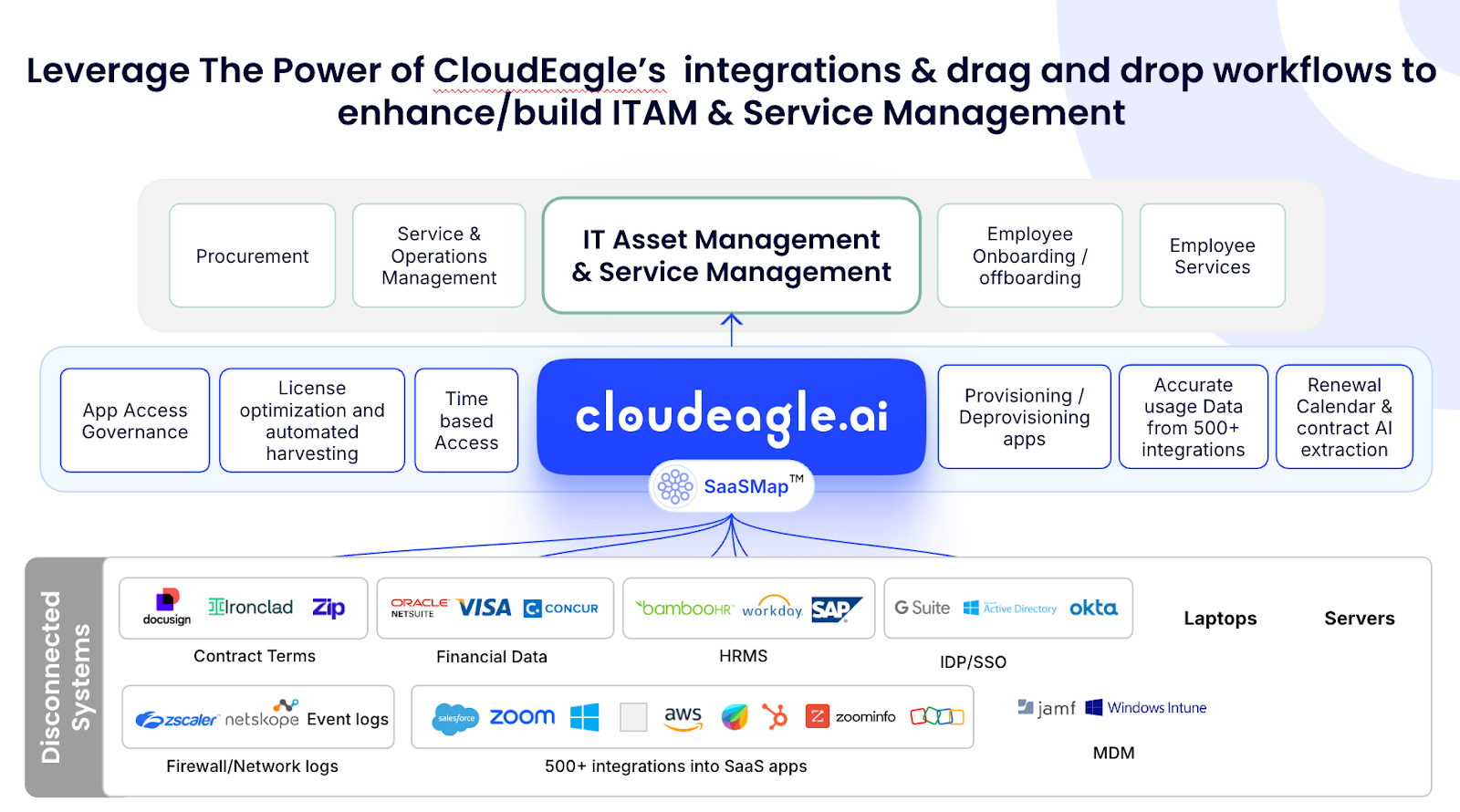
How We Do It
CloudEagle.ai generates a renewal calendar using AI-extracted metadata or integrates with CLMs like Ironclad, DocuSign, or Zip. Renewal workflows trigger 90 days before the notice period, assigning tasks to finance, legal, and business owners.
Why We Are Better
Teams receive alerts with usage insights, price benchmarks, and alternative options. Approvals are tracked automatically, preventing missed renewals and unnecessary spend.
7. Leverage Vendor Dashboards
CloudEagle.ai provides vendor dashboards for a complete view of DocuSign subscription data. Teams can track license usage, renewal dates, and spending patterns to make informed, data-driven decisions.
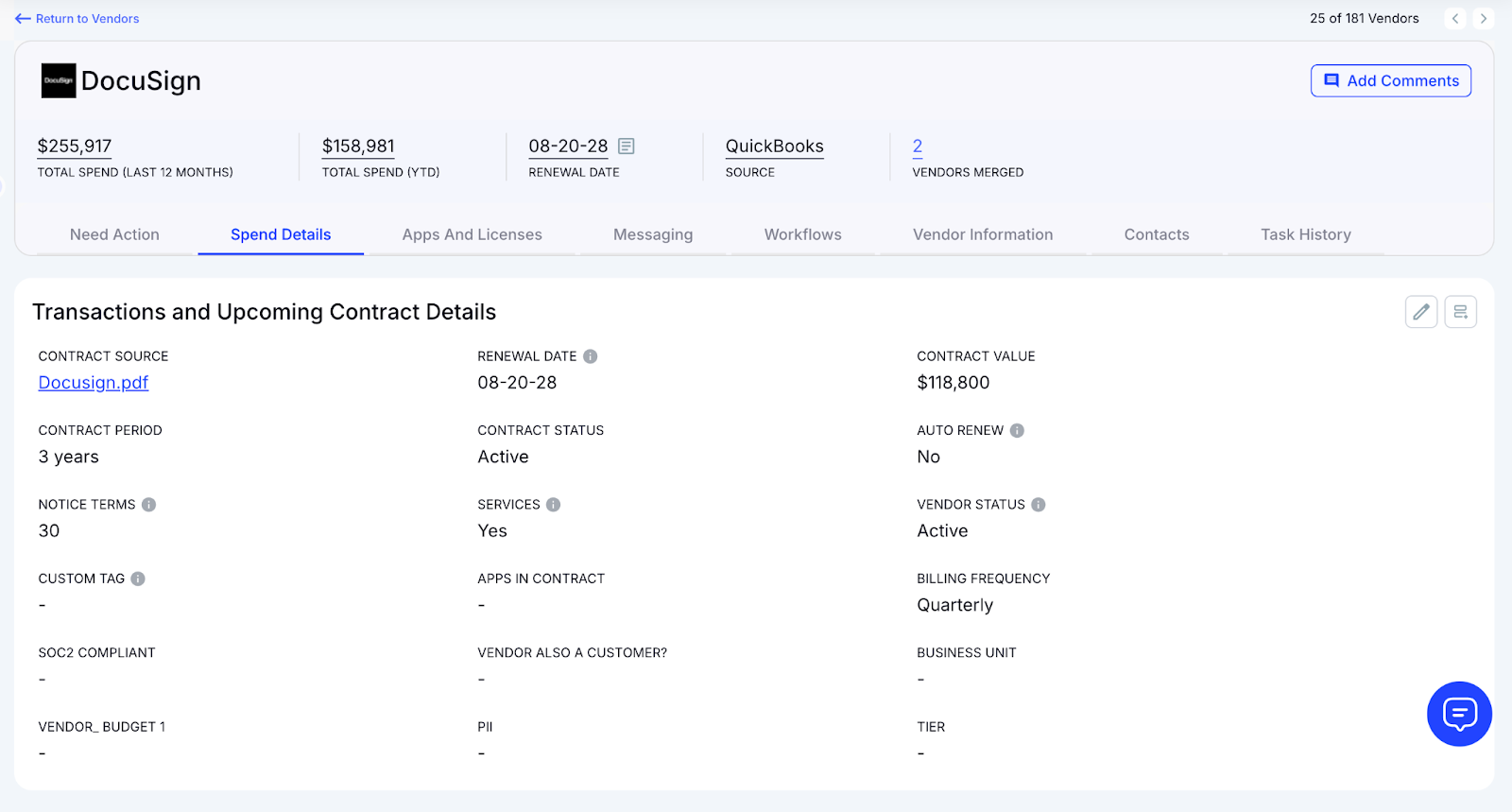
These dashboards reveal overspending and unused licenses, making resource reclamation simple. They also identify usage trends, helping organizations adjust subscriptions proactively and optimize DocuSign license costs.
8. Simplified App Access Management
CloudEagle.ai streamlines DocuSign access by allowing employees to request licenses directly through the platform or Slack, removing lengthy email chains and manual steps. Managers can review and approve requests in real time, ensuring quick access.

This approach ensures employees receive the correct licenses without delays and eliminates approval bottlenecks. Each access request is logged for transparency and compliance, making app access management efficient while reducing administrative workload.
Conclusion
Mismanaged DocuSign licenses aren’t just a line item on a budget. They quietly sap efficiency, create compliance headaches, and open doors to security risks. Enterprises juggling multiple subscriptions and inconsistent usage tracking often end up paying more than they should.
Smart license management is no longer optional. CloudEagle.ai offers features to centralize oversight, automate tracking, and make sure every DocuSign license is working as hard as your team does.
FAQs
1. Is DocuSign a document management system?
Not exactly. DocuSign specializes in electronic signatures and contract workflows. While it handles document storage and tracking, it’s more focused on signing, approval, and secure delivery than full-scale document management.
2. How to provide access to DocuSign?
Access is granted through the admin console. You can invite users via email, assign them roles (like sender, signer, or viewer), and define permissions based on their responsibilities. Always ensure roles align with your team’s workflow to avoid confusion.
3. How do I access the DocuSign admin?
Simply log in to your DocuSign account and navigate to the Admin tab. From there, you can manage users, configure settings, view licenses, and monitor usage metrics. Admin access is typically reserved for account owners or designated managers.
4. Can multiple people use one DocuSign account?
Technically yes, but it’s not recommended. Shared accounts make tracking usage difficult, create compliance risks, and can lead to security vulnerabilities. Individual accounts with assigned roles keep activity transparent and auditable.
5. How do I change the permissions in DocuSign?
Permissions can be adjusted in the Admin console under user management. You can assign or revoke roles, enable or disable features, and ensure users only have the access they need. Regular reviews help prevent over-permissioned accounts.

%201.svg)









.avif)




.avif)
.avif)




.png)









